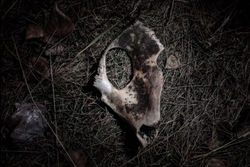 |  |  |
|---|---|---|
 |  |  |
 |  |
Palingenesis Is my presence on this earth just a temporary phenomenon? Will I leave behind something that will grow into a new meaning after me? Will only memory and ashes remain of me? They will exist only as long as people remember them. I am here temporarily. But temporality is not the absence of meaning; on the contrary, it is precisely because of its ephemerality that each moment becomes unique and filled with significance. In nature, there are no losses, only transformation, reminding us of the hidden power of renewal. But for this, the "I" must fall, take root, and endure the destruction of its own shell. Humans often strive to avoid destruction, not understanding that it is in destruction where the source of transformation and new meanings lies. The ruins of the past are not merely remnants but traces of history that speak to us, if we are willing to listen. Bones are the forgotten past that speaks across time. Only they remain unchanged for millions of years... A human, as a part of nature, carries within them the memory of generations, the experience embedded in their blood, and the connection to the earth on which they stand. But when a person ceases to live, only the memory of them remains, supported only by others. Yet nature teaches us that even in death, there is meaning. What we perceive as ruined, nature sees as a stage. Perhaps our task is to find beauty not only in life but also in its end, in the decay, in the freeing of space for the new?..